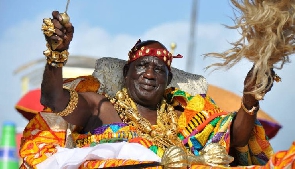 The paramount chief of Cape Coast, Oguaamanhen Osabarimba Kwesi Atta II
The paramount chief of Cape Coast, Oguaamanhen Osabarimba Kwesi Atta II
The paramount chief of Cape Coast, Oguaamanhen Osabarimba Kwesi Atta II, has posited that the central government has too much power. According to him, the powers of chiefs, who had complete control of their territories before the colonial era, have almost been completely taken away by political authorities. Osabarimba Kwesi Atta II said that chiefs nowadays have to seek permission from politicians in the capital town of Ghana, Accra, before they are allowed to do anything on their own land, asaaseradio.com reports. “With the advent of politics as we see it today, chiefs as it were, are relegated to the background. The position they held and the part they played is not the same today; where you had the power to do certain things, you do not have the same power now. “You have to channel certain decisions to Parliament and even to the government before you implement certain things and I wouldn’t say it’s an affront, but it subjects the chief to either the government or to Parliament and that was not the case in the past. It is a nuisance; it’s a delay in the resolution of matters in your own environment,” he said. “For example, if you are chief, that land of which you are the chief belongs to you [hold it in trust for the people] and therefore, anything whether minerals or whatever there is in that land, you should have control. If you are misusing it your people are there to check on you,” the chief is quoted to have said by asaaseradio.com. He added that “Why should I go to Accra to get a permit before I can explore what is in my own land? … you can have your treaties but leave my land for me.” The Oguaamanhen’s comments come following conservations on the role chiefs play in leasing lands for mining activities in the country. Many Ghanaians have said that chiefs are complicit in the menace of illegal small-scale mining, otherwise known as ‘galamsey’, in the country. But the chiefs have maintained their innocence, saying that they are not the ones who give out mining licenses to prospective miners. You can also watch this episode of People & Places here:
The paramount chief of Cape Coast, Oguaamanhen Osabarimba Kwesi Atta II, has posited that the central government has too much power. According to him, the powers of chiefs, who had complete control of their territories before the colonial era, have almost been completely taken away by political authorities. Osabarimba Kwesi Atta II said that chiefs nowadays have to seek permission from politicians in the capital town of Ghana, Accra, before they are allowed to do anything on their own land, asaaseradio.com reports. “With the advent of politics as we see it today, chiefs as it were, are relegated to the background. The position they held and the part they played is not the same today; where you had the power to do certain things, you do not have the same power now. “You have to channel certain decisions to Parliament and even to the government before you implement certain things and I wouldn’t say it’s an affront, but it subjects the chief to either the government or to Parliament and that was not the case in the past. It is a nuisance; it’s a delay in the resolution of matters in your own environment,” he said. “For example, if you are chief, that land of which you are the chief belongs to you [hold it in trust for the people] and therefore, anything whether minerals or whatever there is in that land, you should have control. If you are misusing it your people are there to check on you,” the chief is quoted to have said by asaaseradio.com. He added that “Why should I go to Accra to get a permit before I can explore what is in my own land? … you can have your treaties but leave my land for me.” The Oguaamanhen’s comments come following conservations on the role chiefs play in leasing lands for mining activities in the country. Many Ghanaians have said that chiefs are complicit in the menace of illegal small-scale mining, otherwise known as ‘galamsey’, in the country. But the chiefs have maintained their innocence, saying that they are not the ones who give out mining licenses to prospective miners. You can also watch this episode of People & Places here: